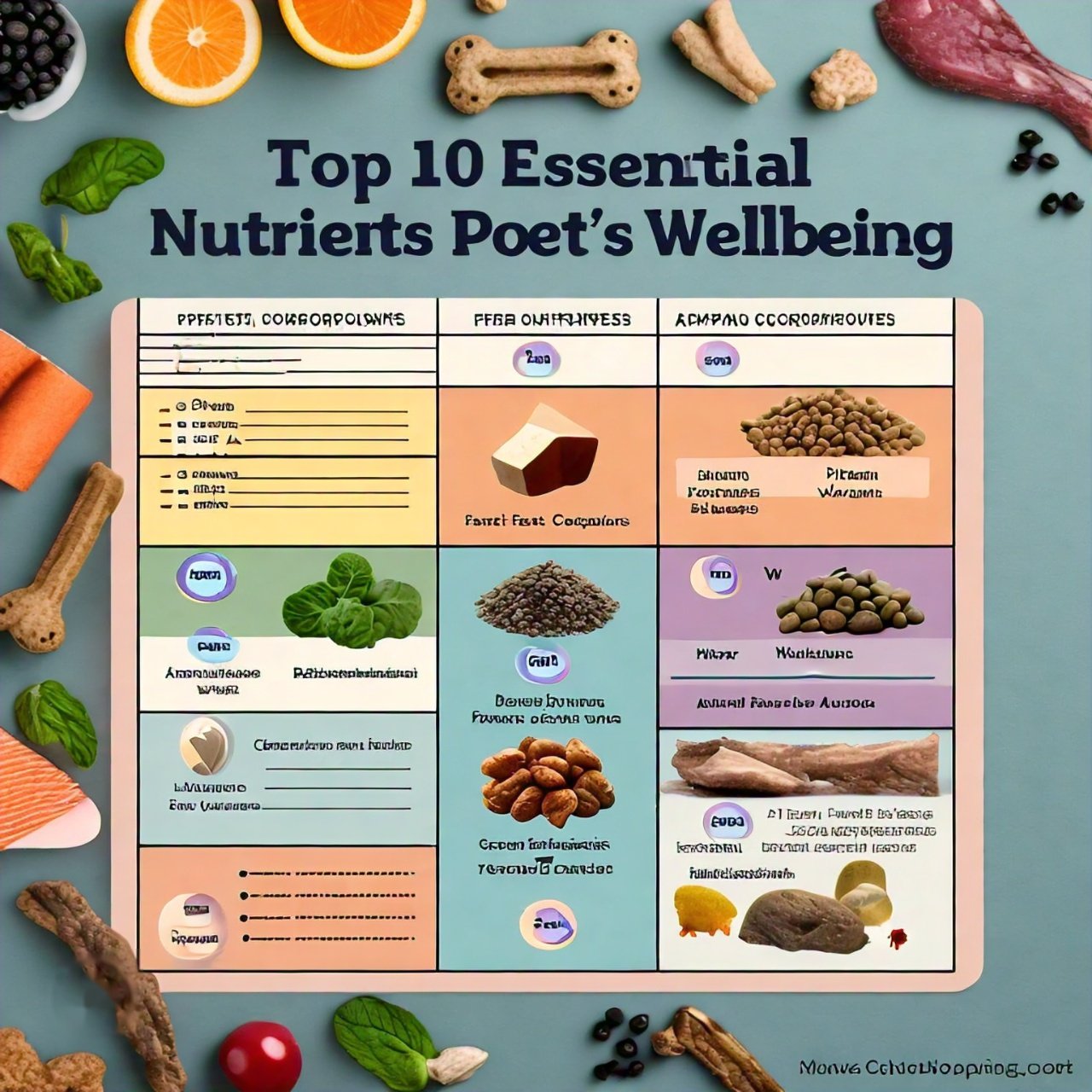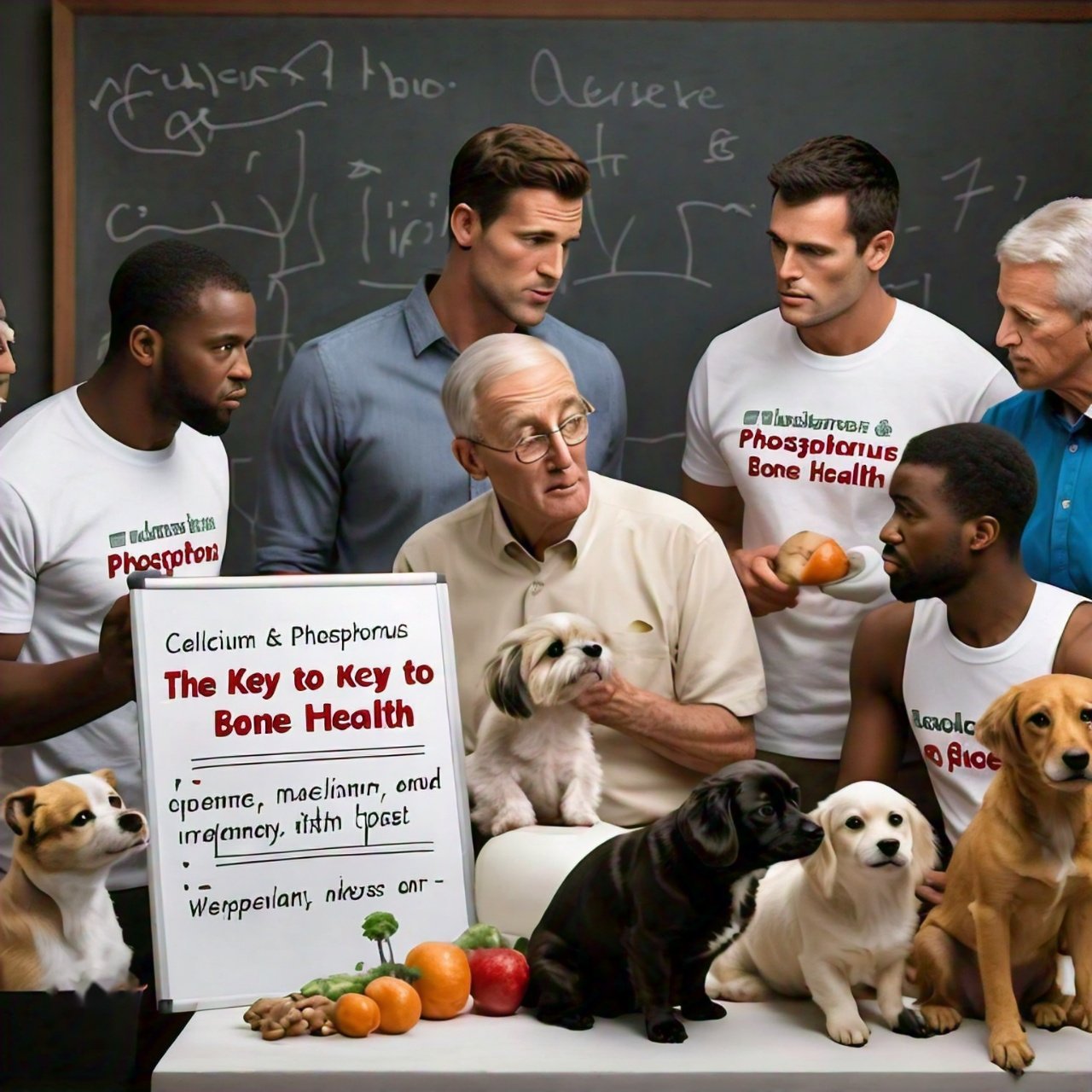Top 10 Essential Nutrients for Your Pet’s Wellbeing

Pet food remains among the most important determinants in the health fitness and well-being of your pet animal. As we do, pets also require the right nutrition alongside enough vitamins and minerals, in addition to nutrients during their growth. Pets need right foods to grow healthy, be strong and disease free, to battle illness, to recover from injuries or to get a good life with lots of liveliness. At the same time, feeding pets with low-quality or quite improper diet can cause different health issues in the future. A shortage of sufficient nutrition for your pet leaves the animal at an increased risk for a wide variety of health problems, including obesity, diabetes, gastrointestinal disorders, dental diseases, arthritis, cancer, organ dysfunction, and a lesser immunity. Other common signs of nutritional deficiency include: hair loss, skin coach, loose droppings, occasional vomiting, decreased food intake, weight loss, pus-like eye discharge, slow healing rates, and lack of energy. Feeding the right diet at an early age: feeding a growing pet like puppies and kittens correctly can help them live the longest and most comfortable life possible. People who own pets must consult and understand their pet’s diet depending on species, breed, age, size, and diseases that affect them. Speaking with your vet can help with decisions on choosing a good quality commercial food, deciding to feed raw or cooked from home, establishing a feeding regimen, dealing wit hweight issues, and using supplements if required. Understanding the critical role of diet so closely tied to what you allow your pets to consume makes them fuel for play, for work and building muscles, fighting diseases and generally living joyful fulfilling years side by side with you. I think it was about the diet that can make a huge difference.
Proper feeding, or good nutrition, is just as important in looking after pets, particularly in relation to dogs. It’s true that the proverb ‘You are what you eat’ fits pets as it fits those who own pets. It’s important to ensure that your cat or dog has a diet that is balanced, full of necessary nutrients and which is duly recommended for species, certain age and activity level of the animal. The elements that should be present in your pet’s diet include: water, protein, fats, carbohydrates, vitamins and minerals, though there are six of them. Water is important to all the bodily processes in the body. Protein offers essential amino acids needed for muscles maintenance, replenishment and building. Fats are energy providing nutrients which also contain essential fatty acids. Another source of energy is carbohydrates. Vitamins and minerals allow biochemical reactions that help all of our body’s machinery function correctly. Based upon similar differences in cats and dogs it is important that the animal receives adequate levels of all categories from nutrient dense whole foods. With commercial pet foods to include kibble, canne, raw, freeze-dried or fresh refrigera, it is more about label reading to ensure the nutrient balanced foods meet the nutritional adequacy statement to bodies such as AAFCO or FEDIAF. Be sure that manufacturer indicates that food trials show that formulation provides the required profile for complete and balanced diet. That eliminates the speculation when selecting foods that contain specific balanced nutrition that your pet requires to lead a healthy and happy life. Having the best or appropriately sourced food, and feeding your pet appropriately based on their species is perhaps the biggest thing you can do for your pet’s health throughout their life.
There is even more to feeding your pet if you want them to lead healthy lives as a pet owner you need to feed them well. Pet food labels contain important information about the nutritional makeup of the food, including the 10 key nutrients your pet needs to stay healthy:
- Protein - Necessary in the formation of muscles, organs, and our immune system. Seek out animal-source proteins that are as lean as possible such as skinless chicken, lean red meat such as lamb, or fish.
- Fats - These are rich sources of energy and contain the fatty acids that are so vital in the body. Look for omega-3 and omega-6 fatty acid sources in fish oils, vegetable oils, and animal fats on labels.
- Vitamins - These micronutrients include important nutrients needed for body health such as Vitamins A, B, C, D, E, and K.
- Minerals - Major minerals including Calcium and phosphorus are responsible for bone formation whereas trace minerals including Iron, Zinc, Copper, and Iodine are essential for enzyme activities and oxygen-carrying processes.
- Carbohydrates - Ensure stored energy through grain, vegetables, fruits, and pulses. Especially, go for the whole grain parts of the carbs if available.
- Fiber - This helps to ease digestion, nutrient intake, and also ease bowel movements. Both soluble and insoluble forms of fiber are preferred.
- Water - Of every nutrient available, water influences the broadest range of metabolism, thermoregulation, and the function of diverse organs. Canned foods are normally associated with additional content of moisture.
- Prebiotics & Probiotics - Help the good bacteria in your gut and maintain good digestion. Search for guaranteed live cultures and fresh fructooligosaccharides (FOS) and inulin fibers.
- Antioxidants - Remove free radicals in the cells of the human body by reducing chances of diseases. These are principally vitamin E, vitamin C, beta carotene, and lutein.
- EFA’s - Omega-3 and Omega-6 fatty acids are involved in skin/coat health, immune system, brain development, etc. Major sources include fish, plant oils, meat fats, and eggs.
Guest Blog: Why Proper Pet Nutrition Matters

The right balance of proteins, healthy fats, vitamins, minerals, and other nutritional compounds in your pet’s diet affects nearly every part of their health, including:
- Physical growth and development
- Body condition
- Skin, coat & dental health
- Immune system function
- Energy levels & mood
- Brain development and function
- Vision health
- Bone and joint health
- Deglutition & ingestion
- Organ function (liver, kidney, heart, etc.)
Feeding a Poor-Quality Diet Can Lead to Issues Like:
- Nutrient deficiencies
- Lost or damaged hair coat
- Skin conditions such as itching, flakiness, and infections
- Tooth & gum disease
- Obesity & related illnesses
- More infections resulting from low immunity
- Gastrointestinal disorders such as vomiting, diarrhea, constipation & Inflammatory Bowel Disease
- Organ disease and failure later in life
The bottom line? Feeding your pet the right meals at the right time each day depends on the species, breed, age, and size to help them grow healthy is actually the best thing any pet parent would do!
Nutrition…The Key to Pet’s Happiness & Health: 10 of Its Basic Elements

Here are the top 10 vitamins, minerals, and other nutritional compounds your furry BFF needs most for optimal health and longevity:
| Nutrient | Importance |
|---|---|
| Protein | Necessary for organs, muscles, and overall body function. Meat sources contain essential amino acids. |
| Fats & Fatty Acids | Provide energy, aid in vitamin absorption, and support skin/coat health. Essential fatty acids include Omega-3 and Omega-6. |
| Vitamin A | Essential for vision, reproduction, growth, and immune system function. Found in animal tissues. |
| Thiamine (Vitamin B1) | Supports carbohydrate metabolism, brain function, and growth. Deficiency can cause neurological disorders. |
| Riboflavin (Vitamin B2) | Enhances cell energy production, vision, skin, and coat health. Works with other B vitamins. |
| Vitamin B12 | Important for nerve function, cell division, DNA synthesis, and red blood cell formation. |
| Vitamin D | Works with calcium for bone health and density. Prevents rickets in growing pets. |
| Calcium | Essential for bones, muscles, nerves, blood clotting, and enzyme function. Requires balanced Ca:P ratio. |
| Phosphorus | Works with calcium for bone and tooth health, kidney function, and protein production. Requires proper Ca:P ratios. |
| Iron | Transports oxygen in red blood cells, supports the immune system, and is important for pregnant pets. |
Why Protein is #1
Among all macronutrients, protein is probably the most critical nutrient to cats and dogs. Pets, especially dogs and cats, are at risk of contracting diseases or having stunted growth, losing muscle mass, and having a weakened immune system if they are denied the protein they need.
Protein from meat, poultry, or fish meets the pet's requirement for amino acids that make up almost every aspect and function of the pet’s body. Plant proteins are incomplete and lack most of these essential amino acids, making them unsuitable for obligate carnivores like cats and dogs.
When inspecting pet food packaging, look for named meat, poultry, or fish rather than the term ‘meat meal’. The first five ingredients should be whole food, clearly identifiable sources of protein. Food for adult cats should have at least 18% protein, while food for puppies or pregnant/nursing cats should have 22% protein and above.
Healthy Fats for Energy and Nutrient Absorption

Fats and fatty acids are essential macronutrients for pets. Healthy fats from animal sources provide highly available energy and aid in the absorption of fat-soluble vitamins A, D, E, and K. Essential fatty acids like Omega-3s (EPA/DHA) and Omega-6s support skin/coat health, immune function, and brain development.
When choosing pet food, look for specific fats/oils like chicken fat, fish oils, and flax oils rather than ‘animal fat’. The Omega-3 & Omega-6 fatty acids’ ratio, DHA, and total fat content are crucial for skin & coat health, energy, and overall well-being.
Full, Tasty Vitamin Care
Vitamins are vital for your pet’s future well-being. The water-soluble B complex and fat-soluble vitamins A, D, E, and K are essential for various bodily functions.
Vitamin A is needed for vision, reproduction, growth, bone development, and immune system regulation. Cats and dogs need “preformed” vitamin A from animal tissues rather than beta-carotene from fruits and vegetables.
B-complex vitamins include riboflavin, niacin, B6, B12, thiamine, and more. They transform food into energy, synthesize red blood cells, and affect cognition and cell health.
Vitamin D ensures dense and healthy bones, prevents rickets, and supports brain, mood, immune system, and kidney health when combined with balanced calcium.
Quality pet foods provide complete and balanced vitamins that your furry companion requires. Look beyond %DV and read labels that provide actual amounts of vitamins/minerals.
Calcium & Phosphorus: The Key to Bone Health

Maintaining a proper calcium to phosphorus ratio is crucial for bone formation, muscle & nerve signaling, electrolyte balance, and kidney function. Lactating, growing, and pregnant animals require adequate calcium and phosphorus for bone, teeth, and tissue development.
Most high-quality pet foods deliver appropriate Ca:P ratios for maintenance or growth. Typically, a ratio of 1-1.5:1 is optimal. For optimal bone development, ensure pet foods contain adequate vitamin D and other bone-building nutrients like magnesium.
Iron & Other Trace Minerals
Trace minerals like iron, zinc, copper, iodine, and selenium are essential for various bodily functions. Iron facilitates oxygen delivery, supports metabolism, and provides energy. Pregnant animals require more iron intake to nourish growing fetuses.
High-quality pet foods supply complete and balanced trace nutrients, ensuring your pet gets the right combination without dangerous overdoses. Focus on total mineral quantities and appropriate proportions.
Selecting Foods Full Of Nutrients

To understand all the important nutrients that your pet requires in his/her diet, is quite a daunting task. These directions and recommendations leave one confused due to the number of options available out there. But you could be relaxed knowing that science diets complete and balanced pet foods developed by veterinary nutritionists offer whole health in one bowl for pets. These specialist formulate diets to provide the appropriate proportions of proteins, fats, vitamins, minerals and many others for a specific pet depending on the animal’s development process or size. This saves pet parents time and confusion and there is no way Petco would get this wrong since not knowing a pet’s age can negatively impact the value of the product. With dry kibble or canned food as well as now, there are refrigerator type foods which also deliver the bio-available nutrients to support the immune, digestive, skin, coat, and other bodily systems levels. Wellness is a core objective that leading brands in the producing of pet foods claim to have employed research in formulation for. Thus although figuring out optimal nutrition appears rather complex total body commercial diets make it easy and hassle free. Nutrition at the next level, balanced and so delicious it will make your pet the healthiest it can be when it gets the right nourishment every time it eats.
Here are quick tips for identifying nutrient-rich cat and dog foods:
- Select products with visible whole foods like meats/fishes.
- Look for the “complete and balanced” statement for the life stage.
- Emphasize a few quality ingredients.
- Consider your pet’s age, size, and activity level.
- Provide access to clean water at all times.
By adhering to these best practices, you ensure your furry best friend receives proper nutritional requirements, maintaining their health and well-being.




